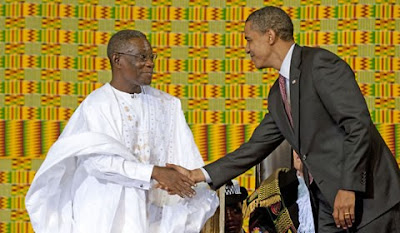Four African leaders are participating in this year’s G8 summit at Camp David on May 19 for a discussion session on accelerating progress towards food security in Africa, a statement inviting the president of the Republic of Ghana has stated.
The statement signed by the White House Spokesperson Jay Carney indicated that President John Evans Atta Mills of Ghana, President Yaha Boni of Benin, Tanzania president Jakaya Kikwete and Ethiopian Prime Minister Meles Zenawi would be taken part in food security session of the summit.
The summit discussions will centre on security will also discuss extensively on food security in Africa and the world at large and how to tackle the looming crisis in the wake of climate change and global warming.
This is not the first time Africa leaders are participating in a high level meetings internationally, however such meetings often do not bring Africa deprivation to an end. Mostly, members of the G8 earn political points with vague promises to elevate the poorest continent from deprivation.
Several of such meetings promises to Africa never came through. In certain situations the promise(s) came but with restrictions that tied the hands of the leaders to utilize such support effectively. “The word conditionality that is often embedded in agreements sign between the developed and developing nations is worrying”, says Albert Meinbah, expert in Africa development.
The meeting which comes at the time the world leaders are preparing for Rio+20 Earth Summit will need to focus also on how to reverse climate change and global warming as evidences of the situation abound. Climate change is worsening the plights of Africa continent. Despite the evidence of climate change increasing burdens on the poor people, G8 members continue to remain relatively silence over Africa food insecurity and sustainable development situation.
Africa, though played crucial roles in world affairs, it was still struggling to gain a strong voice at international level. Why must decisions be taken on behalf of Africa without her involvement? This is certainly amounts to “colonialism” and “suppression”. Recent resolved by G8 members to allow Africa leaders take part their summit is laudable however, the voice of the continent must not always be down played recognising that problems in Africa affect the world.
If G8 members are concern about food insecurity in Africa it must as a matter of urgency ban the sale of unacceptable agro-chemicals including chemical fertilizers, which is said have helped destroy farmlands of the poor continent. These chemicals are produce by G8 members most specifically for the poor continent farms.
G8 must also support the continent to reclaim rights to Rio+20, and other international agreements that will elevate the continent from the back bench to front runners that push them rethink of their responsibilities to their own people. Food Sovereignty in Africa should be seen as a collective responsibility.
The United Nation Framework Convention on Climate Change (UNFCCC) highlights two Approaches to respond to the causes and impacts of climate change: mitigation of climate change by reducing Green House Gas emissions (GhGs) particularly carbon dioxide and methane; adaptation by limiting the negative impacts of climate change on social and ecological systems.
Africa which just came out from the net of colonialism will need helping hands to survive the brunt of climate change. It need to be supported to adapt and mitigate. Waiting for the continent to however develop her responses to global warming to reduce the impacts of the changes which had affected agriculture causing food insecurity will not only affect the progress of the continent but the entire world.
Effective climate policy response sets; the adaptation and mitigation are costly cheaper than managing the aftershocks hence the need for policy support.
The G8 countries which comprises France, Britain, Italy, Germany, Canada, Japan, the US and Russia are most industrialized nations whose progresses were done at the expanse of weaker nations admittedly.
The involvement of Africa leaders in food security discussion during the G8 summit must necessarily help prepare the roadmap that will lead the continent out of the foreseeable climate change impacts and reduce the vulnerability of the continent.
The time has come for Africa leaders not to fold hands at international meetings but keep reminding the world particularly the G8, their role and responsibilities to the current stage of Africa and demand accountability.
Inviting Africa leaders to partake in high level meetings such as the G8 does not matter as far as the problems persist in Africa. What is important in African participating in such meetings is to allow them discuss the problems faced the continent while the meeting discuss, design and implement roadmap to eliminate poverty, hunger, malnutrition, and infant and maternal deaths.
Africa deserves such recognition and assistance and G8 cannot afford to fail the continent again but must support its agriculture for sustainable food security, support the development of her industries and management of her natural and human resources to enable her cope with the shocks of climate change.

No comments:
Post a Comment